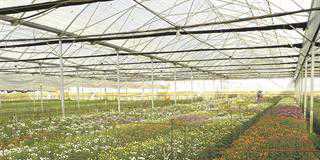
Photo: Courtesy of Astral Foods
South African poultry producers listed on the Johannesburg Stock Exchange (JSE) have returned handsome capital growth to investors who stuck with them while higher imports and expensive maize squeezed the companies’ profits during 2012 and 2013. The price of maize, which constitutes the bulk of poultry companies’ cost base, has since slumped, giving chicken producers breathing room to recover their margins.
READ:10 ways to make sure your poultry stay healthy
The country’s cheapest source of protein, chicken has also been buffered against lower consumption as consumers feel the pressure of South Africa’s higher interest rates, high unemployment, industrial action and anaemic economic growth. Growing confidence in the poultry industry saw the listing of Quantum Foods, primarily an egg producer and feedmaker after it was spun off Pioneer Foods. Country Bird Holdings, which ranked third in poultry-related sales after Astral Foods and RCL Foods’ Rainbow Chicken, saw its minority shareholders bought out by a private-equity firm that has its sights set on expansion into Africa.
Not even a R143 million loss at Country Bird dampened the investor’s appetite for the industry.Astral increased its sales by 13% to R9,6 billion in the financial year ending September while after-tax profit surged 61% to R341 million, according to its financial statements. The share returned 141% to investors over the 12 months ending 4 February. Country Bird, which was delisted from the stock exchange on 17 December, saw a 13% rise in sales to R3,58 billion in the financial year ending June. However, the company turned a R58 million profit for 2013 into a R143 million loss by the end of June, its statements said.
Black River Asset Management, a subsidiary of the global food-trading giant Cargill, bought the approximately 20% shares that Synapp did not own in the company for a calculated R202 million. The two shareholders delisted it from the JSE. Synapp is the controlling shareholder of Country Bird. Quantum Foods, which was listed on the JSE on 6 October, saw its revenue grow by 2% to R3,56 billion in the financial year ending September. It shrank its loss to R8,4 million from R286,8 million a year earlier.
Sovereign Food Investments, based in the Eastern Cape, posted a 21% jump in sales to R841 million during the first six months of its financial year ending in August. The after-tax profit climbed 46% from with the previous year’s first half to R21 million.
Challenging times
The last three years have been difficult for poultry producers. As costs rose due to higher maize prices, producers were unable to increase prices because of imports, Chris Schutte, CEO of Astral, says. “Medium to smaller chicken farmers were pushed out of the market and some consolidation took place,” he explains.
The poultry industry slaughtered 19,8 million chickens per week at the height of production and this has declined to 19,2 million per week. “The capacity to produce more chickens is there, but it takes a long time to fill it.” This is one reason the industry cannot react to short-term upswings in the demand for chicken. It takes about 24 months from ordering genetic breeding material in Scotland to putting a chicken product on a consumer’s plate, Schutte explains.
Chris Coombes, CEO of Sovereign Food, says that per capita consumption of chicken by consumers has remained flat, although overall demand has been driven by a growing population. “Chicken remains the best-priced animal protein and so demand for chicken will always be the strongest in the animal protein category,” he predicts. “As for changing consumption patterns, there’s a growing demand for fast food and take-home meals due to the growing middle class.” Schutte says that the demand and supply for chicken are roughly in balance at the moment.
Consumer outlook
The consumer remains under pressure due to high energy and transport costs, Coombes says. But Schutte points out that the recent drop in oil prices and subsequent fuel price decrease should make a little more discretionary disposable income available. “The lower-income groups use this additional disposable income to eat better and chicken is the cheapest source of protein,” he explains. Sales figures from January would be an indication of whether consumer demand was rising as the mass market tend to use their bonuses to buy protein.
The positives
The slump in the price of yellow maize from above R3 800/t in 2013 to its current level of around R2 100/t has been a major boost to chicken producers. “The decline in grain and protein prices will have a positive effect on our cost base,” Coombes says. “Maize and soya beans constitute about 50% to 60% of our farming costs.” At Astral, maize and soya beans constitutes about 65% of costs, Schutte says.
Fuel price decline
The fuel price drop has benefited poultry producers. Diesel comprises about 3% of Sovereign’s cost base and a decline in the price of fuel will have a positive impact, Coombes says. At Astral, diesel constitutes between 2% and 2,5% of the costs of its internal transport, according to Schutte. The company uses independent companies for its outward logistics and the cost is derived as a percentage of the freight value.
Both Astral and Sovereign have managed to pass on price increases to consumers in their recently-reported financial periods.
Astral’s poultry division increased sales by 16% to R7 billion for the year ending September as the volume of chicken sold rose 7% and selling prices were 8% higher. Sovereign’s 21% jump in sales for the six months ending August was attributed to a 7% increase in the volume of chicken sold and a 12% rise in prices.
Both companies are targeting Africa for future growth. Astral’s divisions in the rest of the continent saw revenue growth of 13% to R499 million in the 12 months ending September. The company has broiler breeder and hatchery operations in Zambia and Mozambique as well as an animal-feeds unit in Zambia. “Animal protein demand in Africa will be strong over the next 20 years due to the growing population and changing diets,” Coombes says.
“Sovereign is actively expanding its sales in Southern Africa both through our current SA trading partners and via export sales.”
Eskom hits poultry producers
Rolling electricity blackouts are hitting SA’s major poultry-producing companies and there are fears that the industry will struggle to remain competitive with offshore producers. Planning and efficient scheduling of power outages should mitigate the effect on production, according to Chris Schutte, CEO of Astral Foods.
“We’ve accepted in general that load shedding is the best alternative for SA in the meantime,” he says. “We ask Eskom to plan better. It needs to help us to help it.” The blackouts could make producers more uncompetitive, Schutte says, adding: “The industry is not inefficient in production, but we’re cost-inefficient.”
According to Coombes, Sovereign has back-up generators at its farms and hatcheries and feedmill, which leads to additional diesel costs.
Avian influenza ban flouted
The Department of Agriculture, Forestry and Fisheries implemented a ban on the importation of chicken products from Germany and Netherlands on 20 November following the outbreak of avian influenza (bird flu) on chicken farms. Producers from these countries are now apparently routing their products through neighbouring states, according to Astral Foods’ Schutte. Sovereign Food’s Coombes said producers from those states faced with anti-dumping levies had also rerouted their products.
Phone Astral Foods on 012 667 5468 and Sovereign Food on 041 995 1700.
This article was originally published in the 20 February 2015 issue of Farmers Weekly.













